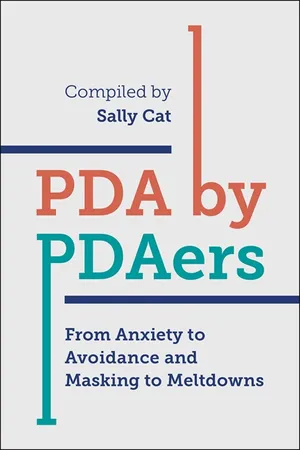
- 352 pages
- English
- ePUB (mobile friendly)
- Available on iOS & Android
eBook - ePub
About this book
"To think of PDA as merely involving demand avoidance is to me akin to thinking of tigers as merely having stripes."
This book is a unique window into adult Pathological Demand Avoidance (PDA), exploring the diversity of distinct PDA traits through the voices of over 70 people living with and affected by the condition.
Sally Cat, an adult with PDA, has successfully captured the essence of a popular online support group in book form, making the valuable insights available to a wider audience, and creating a much-needed resource for individuals and professionals. Candid discussions cover issues ranging from overload and meltdowns, to work, relationships and parenting. This is a fascinating and sometimes very moving read.
Frequently asked questions
Yes, you can cancel anytime from the Subscription tab in your account settings on the Perlego website. Your subscription will stay active until the end of your current billing period. Learn how to cancel your subscription.
No, books cannot be downloaded as external files, such as PDFs, for use outside of Perlego. However, you can download books within the Perlego app for offline reading on mobile or tablet. Learn more here.
Perlego offers two plans: Essential and Complete
- Essential is ideal for learners and professionals who enjoy exploring a wide range of subjects. Access the Essential Library with 800,000+ trusted titles and best-sellers across business, personal growth, and the humanities. Includes unlimited reading time and Standard Read Aloud voice.
- Complete: Perfect for advanced learners and researchers needing full, unrestricted access. Unlock 1.4M+ books across hundreds of subjects, including academic and specialized titles. The Complete Plan also includes advanced features like Premium Read Aloud and Research Assistant.
We are an online textbook subscription service, where you can get access to an entire online library for less than the price of a single book per month. With over 1 million books across 1000+ topics, we’ve got you covered! Learn more here.
Look out for the read-aloud symbol on your next book to see if you can listen to it. The read-aloud tool reads text aloud for you, highlighting the text as it is being read. You can pause it, speed it up and slow it down. Learn more here.
Yes! You can use the Perlego app on both iOS or Android devices to read anytime, anywhere — even offline. Perfect for commutes or when you’re on the go.
Please note we cannot support devices running on iOS 13 and Android 7 or earlier. Learn more about using the app.
Please note we cannot support devices running on iOS 13 and Android 7 or earlier. Learn more about using the app.
Yes, you can access PDA by PDAers by Sally Cat in PDF and/or ePUB format, as well as other popular books in Psychology & Abnormal Psychology. We have over one million books available in our catalogue for you to explore.
Information
— 1 —
DEMAND AVOIDANCE
» What the Demand Avoidance aspect of PDA is
» What it feels like (tightening in head and jaw; anxiety; Fight/Flight reaction triggered; an electric storm…)
» Whether it can be controlled
» The need for downtime either side of facing demands
» Whether it is always obvious
» ‘Invisible’ Demand Avoidance (that has operated without conscious awareness)
» What makes it pathological
What is the Demand Avoidance aspect of PDA? What does it feel like? Is it always obvious? Can it be controlled? What makes it pathological?
Stephen Wright A demand is anything not generated by the person with control issues. The level of demand perceived is based on the amount of control the person with PDA has over their life. Not everything is a control issue and not everything is a demand. This question can’t be fully answered except for ‘it depends’.
I don’t have to go to work…I found a job I love. Other people not trusting me has made it so I couldn’t show up to work with a smile and actually have my first true day of work.
Dee Dee I can’t take being told what to do, I need choices.
Pickle Even the demand of thinking about this question has caused the inside of the front of my head to tighten, my mouth to salivate and my jaw to feel tight and also my brain to fog up a little bit. I thought I wouldn’t be able to answer that question but I guess I just did. Add to that anxiety if it is a bigger demand or one that is further ahead in the future.
Little Black Duck It feels like this post with 5 questions and my brain just frazzles itself immediately, not able to find a starting point to even begin. It loops. And loops. And loops some more.
It’s like my body is on freeze frame and my mind is on fast-forward. Within this one person and entity, my response is polarised. Always polarised. Never certain. Never confident. Always fearful. And a lifetime of that response, then creating a secondary ‘fearful of fear’ response.
Alice What you say resonates with me (as it often does, wise one) about my reaction to the initial question in this post, and others. When I read Sally’s questions, my mind frazzled and I almost had a sensation of word blindness and this is something I often experience when faced with a lot of text and the need/desire to respond. I think that this might be Demand Avoidance too.
Julia Daunt It can’t be controlled. It can be juggled in the sense of if I have something important that needs my time and energy then something else will need to be removed for the time being. I can only handle so much anxiety and demands at any one time. It’s a constant juggling/balancing act.
The anxiety that stops me completing things is what I need to reduce/keep low. So if I’ve got an appointment that I must keep then I need to lower my anxiety enough beforehand for me to go to it. This means shrinking back on the demands on me. Everything from washing and dressing to socialising is reduced, sometimes to zero if it’s a big event or something that will require a lot of energy from me, and then I’m able to keep the appointment. If demands are low the anxiety is low and the more ‘able’ I am mentally/cognitively and therefore the more able I am to mask. That’s an added bonus.
When I’m pushed over my limit then I need recovery time. This can be hours, days, weeks or even months. It’s a process that can’t be skipped or hurried. I have to carefully plan out my diary so that there is enough time between events for that recovery and prep time.
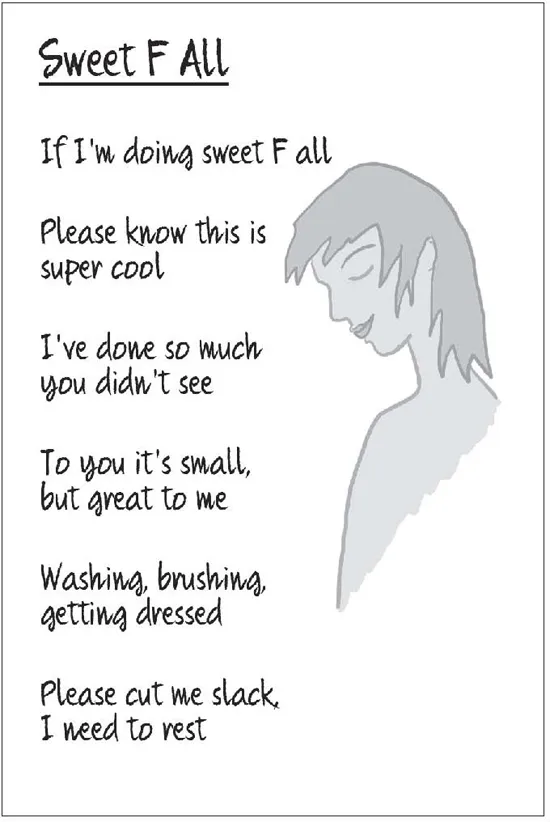
Sally Cat I do this, I kind of super-charge my robustness ahead of appointments, etc., so I can cope with them and then I need quiet space recovery time afterwards. And, yes, too many events lumped together overload me, it’s extremely stressful, my anxiety soars and I can be completely knocked out so I am bedridden.
Julia Daunt I cannot prep for the next thing whilst still recovering from the last. Events are anything – telephone calls, outings, doing lots around the house, admin of groups, emails, talking to friends on Facebook, public speaking – it’s all an event and must be handled carefully. I can feel when I’m close to my limit so I simply withdraw and recover.
Sally Cat I even need recovery time after hoovering the living room, LOL.
Julia Daunt Simple things take only a few hours to recover from and it’s normally a nap. A shopping trip to Tesco, for example, but the big things like a weekend away will need days of prep (doing zero and zero demands) and then about a week’s worth of recovery after. If the event was traumatic, like my train journey to Dover last year, then it can take months of recovery time.
Lauren When talking about PDA with my fiancé, he said, ‘But doesn’t everyone want to avoid demands?’ I said, ‘To an extent, that’s probably true. But how many people have had an experience where they had to shower and do homework in the same night, had an internal struggle to accept and accomplish those two daily demands that was so taxing mentally that they didn’t do either one and couldn’t go to school the next day? Not once, but they had this same struggle almost every day.’ I’m 30, and sometimes I really feel like I’m just being a stubborn child. But then I have to remind myself that it really is a medical condition that’s out of my control (mostly) and I can’t be too hard on myself.
It was much more challenging for me to deal with when I was in high school versus now as an adult. I think it was a combination of things: not being as in control of my life as I am now, because I was a child and many decisions were just made for me. Also, not knowing myself as well as I do now. I can compensate better now as an adult because I can make compromises with myself. For example, I’ll have a discussion with myself in my head like, ‘Okay, I don’t want to shower tonight before bed. But if I don’t shower tonight, that means I have to wake up earlier in the morning to shower (which, to be honest, probably means I’ll be late to work). So which one is it?’ Having options always helps me cope with demands.
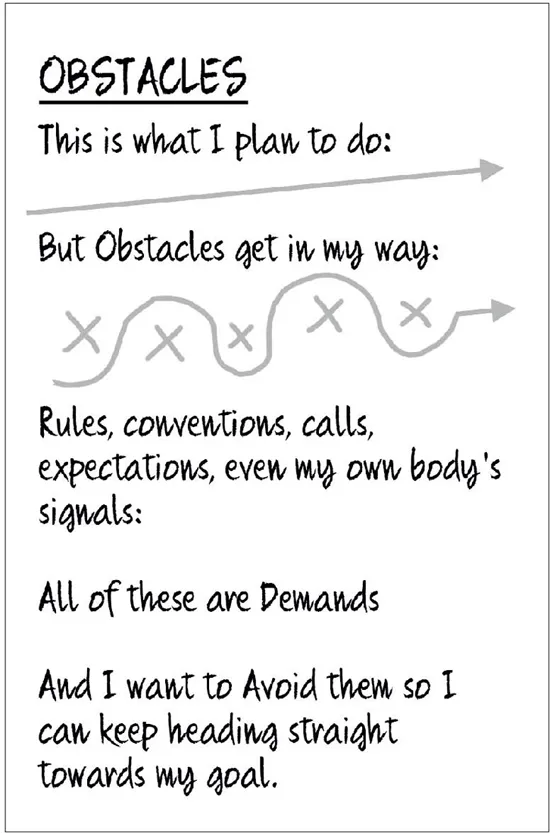
Tracy The internal feeling of demand avoidance, for me, is anxious and tense and overwhelming and LOUD and gets worse as long as I keep trying to push through it to meet the demand…
I tried to describe it to my therapist as saying, ‘Maybe it’s like listening to someone scraping their fingernails on a chalkboard, a sound you absolutely can’t stand, but it just keeps going ON and you have to pretend it’s normal and do stuff like it doesn’t bother you (and maybe even you’re the one causing it but you have to!).’
Or it’s a feeling like if someone gave you a cup of worms and you knew you had to eat them and act like you don’t hate it, but you really do think it’s just gross and awful, but everybody else just thinks it’s not a big deal.
Or it’s like as if you have a really gross scary bug on your skin and you can’t squish it or flick it off, you just have to let it crawl on you while you keep working and pretending you don’t absolutely hate it.
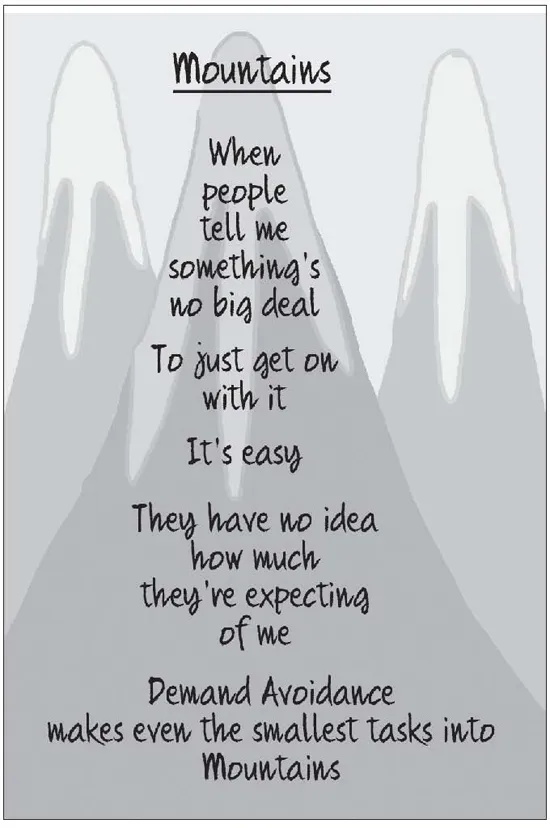
You just have to tolerate that awful feeling, in fact you have to embrace it and do the things that make you feel that way even though they do, and usually also pretend you DON’T feel that way so that you can pass in ‘normal’ society. It’s a really awful terrible feeling but hard to explain or describe to someone who doesn’t seem to get it.
When I feel that way, I get very uncomfortable and amped up and my mind will try to get me to do almost anything to avoid doing the things I still know I have to do, while I am also simultaneously strategizing to try to get myself to get the tasks DONE and OVER WITH (this is at work where I feel I have to get things done OR ELSE).
And I feel very bad about myself because I want to be a person who acts out my values and meets my commitments and yet I never seem to be able to do all that I say I will do, or think I SHOULD do. So I’m not the person I want to be, and that sucks.
And of course she wants to know what is happening when I feel the feeling. So I can give her examples…
I told her that although I love my coworkers and my boss and am passionate about what we’re accomplishing, I am looking for another job. And WHY I am looking for another job is: I have to resort to more and more extreme measures in order to get myself to do the regular, ordinary tasks of my current position, and I want to move on before it gets so bad that I lose my coworkers’ and boss’s respect. I am always excited about a new job for about 3–6 months, and can do it pretty well while I am learning, but then my performance falls off as it becomes routine – because the ordinary tasks become demands. I’ve been at this job for two years and I’m starting to hate myself, and this happens EVERY TIME I have been in a job for this long, no matter what I’m doing or how much I love it.
Or, for an even simpler example, I could tell her what happened last night – that even though I love my husband, when he comes home I get that awful feeling inside when I am thinking I have to go say ‘hello’ to him. It feels like a demand… But when she inevitably asks, ‘Then, do you not like him?’, I have to say, ‘NO! I like him, but I don’t like feeling like I HAVE to say Hi.’ And that doesn’t make sense, and of course it seems like no big deal to her, so she struggles to figure out why it’s hard for me. And everything she comes up with isn’t quite right. So in the end, we don’t relate and I still feel like an alien.
Lucy Clapham If someone tells me I have to do something: ‘go hang up your coat’, for example, I can feel the fight or flight response taking over my body. My stomach feels like it is in knots and I begin to shake. The only way I can calm down is to regain control of the situation. Often this isn’t possible and can lead to what others will call ‘challenging behaviour’ but in reality I am terrified like a small bunny who has seen a hawk! Sometimes, to make matters worse, even demands I set upon myself can trigger this same reaction and this can lead to me living in squalor or not looking after myself. It’s ever so frustrating!
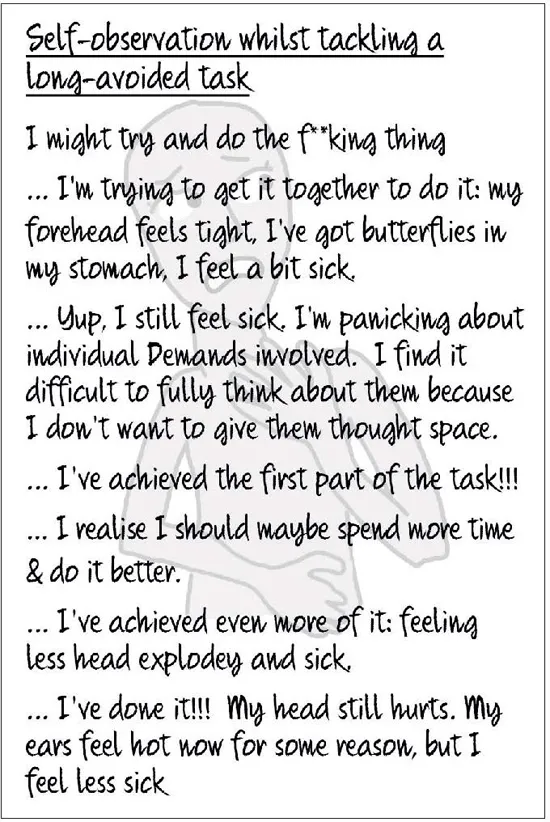
Sally Cat For me, demands are things out of my conscious control (including body signals) and feel like an encumbrance upon me to ‘have to’ deal with them and I automatically resist.
I severely struggle if people give me advice ...
Table of contents
- Cover
- Title Page
- Contents
- List of Graphs
- Introduction
- Original post in the Adult PDA Support Network Facebook group introducing the project to fellow members
- Prologue
- 1. Demand Avoidance
- 2. What Sort of Things Are We Driven to Avoid?
- 3. Anxiety and PDA
- 4. PDA and Masking
- 5. Intolerance of Uncertainty
- 6. Control
- 7. Meltdowns
- 8. Overload
- 9. PDA and People
- 10. Hierarchy and Rules
- 11. Fantasy and Role Play
- 12. Wordplay
- 13. Impulsiveness
- 14. Routine
- 15. School
- 16. Work
- 17. Coping Strategies
- 18. Reasonable Accommodations
- 19. Parenting
- 20. Our Achievements
- Appendix: Statistical Analyses
- Glossary
- Join our mailing list
- Copyright
- Of Related Interest